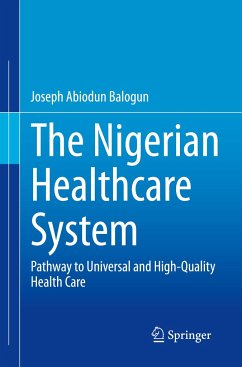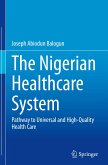The modern-day practice of health care was imported into Nigeria over 500 years ago. In 1947, the first national health plan was developed in Nigeria with the primary goal of providing universal health care (UHC), but this goal remains elusive to date. This comprehensive book presents the roadmap needed to attain UHC in Nigeria and offers a blueprint for achieving high-quality health care in the nation.
Starting with a brief overview of the Nigerian state, the fundamentals of health care, including the challenges to affordable quality healthcare delivery, the author critically examines the healthcare system in Nigeria and offers specific recommendations to invigorate the system and improve interprofessional collaborations. Each chapter includes case studies to allow readers to contextualize the information presented and behavioral learning objectives to test readers' knowledge. Among the topics covered:The Organizational Structure and Leadership of the Nigerian Healthcare System
The Vulnerabilities of the Nigerian Healthcare SystemThe Spectrum of Complementary and Alternative Medicine
Emerging Developments in Traditional Medicine Practice in Nigeria
The Plight of Persons Living with Disabilities: The Visible Invisibles in NigeriaA Comparative Analysis of the Health System of Nigeria and Six Selected Nations Around the World
A Qualitative Investigation of the Barriers to the Delivery of High-Quality Healthcare Services in NigeriaThe Political and Economic Reforms Needed to Achieve Universal and High-Quality Health Care in NigeriaReimagining the Nigerian Healthcare System to Achieve Universal and High-Quality Health Care by 2030The Nigerian Healthcare System: Pathway to Universal and High-Quality Health Care is ideal for adoption as a textbook in health services administration, health policy andmanagement, health informatics, healthcare delivery systems, and primary health care courses offered at universities in Nigeria. It also would appeal to students and faculty in African diaspora programs internationally. The book is also essential for policymakers, health systems technocrats, researchers, and professionals in various health disciplines, including medicine, nursing, and allied health.
Starting with a brief overview of the Nigerian state, the fundamentals of health care, including the challenges to affordable quality healthcare delivery, the author critically examines the healthcare system in Nigeria and offers specific recommendations to invigorate the system and improve interprofessional collaborations. Each chapter includes case studies to allow readers to contextualize the information presented and behavioral learning objectives to test readers' knowledge. Among the topics covered:The Organizational Structure and Leadership of the Nigerian Healthcare System
The Vulnerabilities of the Nigerian Healthcare SystemThe Spectrum of Complementary and Alternative Medicine
Emerging Developments in Traditional Medicine Practice in Nigeria
The Plight of Persons Living with Disabilities: The Visible Invisibles in NigeriaA Comparative Analysis of the Health System of Nigeria and Six Selected Nations Around the World
A Qualitative Investigation of the Barriers to the Delivery of High-Quality Healthcare Services in NigeriaThe Political and Economic Reforms Needed to Achieve Universal and High-Quality Health Care in NigeriaReimagining the Nigerian Healthcare System to Achieve Universal and High-Quality Health Care by 2030The Nigerian Healthcare System: Pathway to Universal and High-Quality Health Care is ideal for adoption as a textbook in health services administration, health policy andmanagement, health informatics, healthcare delivery systems, and primary health care courses offered at universities in Nigeria. It also would appeal to students and faculty in African diaspora programs internationally. The book is also essential for policymakers, health systems technocrats, researchers, and professionals in various health disciplines, including medicine, nursing, and allied health.








